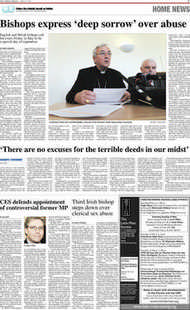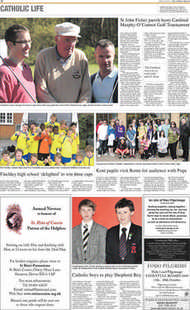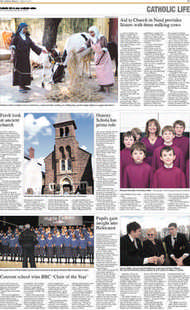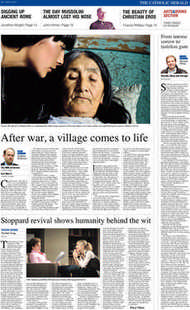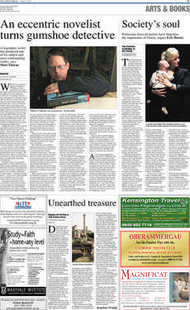Page 9, 30th April 2010
Page 9

Report an error
Noticed an error on this page?If you've noticed an error in this article please click here to report it.
Tags
Share
Related articles
Bishop Beck's Final Advice To Voters
Gove Sets Out His Stall
Democracy In Deadly Peril Dangers Oi New Policy
Could This Really Be You?
Election Darkened By Unwanted Shadow Of Race
The great May gamble
ugh David asks which party leader we can trust with our schools Next Thursday will be polling day and I can’t say I am any clearer this far into what already feels like an interminable campaign on which way to vote. Yes, I can echo the message that we need a change, but the sort of change on offer seems to have severe drawbacks in every case. It will ultimately be a choice, therefore, of the lesser of evils, never a comfortable one.
But what will be the criteria for making that relative judgment? How about taking the future of our statesupported Catholic schools as the sine qua non?
Labour has been, as I have reported in recent years in this column, pretty ambiguous on the subject since Gordon Brown took over as Prime Minister and inflicted the slippery Ed Balls on us as Education Secretary. David Cameron is keener. His children go to a CofE primary, though as with much concerning the Tory leader, it is hard to know whether that is posturing or conviction. And then there are the Liberal Democrats. The big story of this general election so far has been the rise and rise of their leader, Nick Clegg. So much so that he may well be our Prime Minister, or more likely our kingmaker.
In the latter role there are many factors that will have to be weighed before he opts to work with Labour or Conservatives, Brown or Cameron, or conceivably Miliband or Miliband, even Harman at a stretch, but please not Ed Balls (though it appears his constituency, Morley and Outwood, could be vulnerable, raising the delicious prospect that he may provide us with 2010’s equivalent of the Michael Portillo moment in 1997).
Schools policy will be one element in the cobbling together of a government, and in any coalition education could be one of the cabinet posts allocated to the Liberal Democrats. Yet their policy on schools of a religious character is hugely unattractive. Their manifesto pledges to stop such schools from selecting pupils on the grounds of faith. The thinking – hard as it is to disentangle – is that because church schools are often successful, opening their doors to all comers will spread that success to everyone.
It is a foolish argument that overlooks a key component in the achievements of church schools, namely their shared faith ethos. I know it is unpopular to say it, but having a religious element across the life of a school does have a tendency to bring with it success, academic, emotional and – of course – spiritual.
Clegg would no doubt say that you could still have that faith ethos in the teaching and management of the school, just not in the intake. This raises a few practical questions. First, if you were not Catholic, or Muslim, or Jewish, would you really want your child going to a school where Catholicism, Islam or Judaism was woven into the life of the place, not only in the RE classes and collective acts of worship, but in the very fabric? I suspect not. So either no one would apply other than the faith group concerned – making it a pointless reform – or you would see an influx of parents who very quickly would start agitating for the “religious mumbojumbo” to be played down, relegated and finally removed. At which stage chaos would ensue and children would suffer.
Before dismissing the Liberal Democrats, though, there is another element to take into account. Clegg mania has meant that we have learnt an awful lot about the Liberal Democrat leader in recent weeks – some of it so flagrantly manipulative from the Tory press that I cannot bear to repeat it, but some of it has nice domestic touches. Like his liking for Alsatians. And his link to Catholicism.
Variously described as atheist or agnostic, Nick Clegg is married to a Catholic, the international lawyer Miriam González Durántez. She comes from Valladolid in Spain (a city with a long history of offering a haven for English Catholics in its seminary during the post-Reformation persecutions and on until modern times). Mrs Clegg is a regular Mass-goer – at St William of York in Ecclesall Road in her husband’s Sheffield Hallam constituency, and at Our Lady of Pity and St Simon Stock in Putney, near their London home. And Nick Clegg usually goes with her and their children, it has been reported.
Moreover, the couple send their two oldest children – Antonio, eight, and Alberto, five – to Our Lady of Victories Catholic Primary in Putney. Its most recent Ofsted inspection grades it in the top category – outstanding – and quotes a parent as saying “this is an excellent school with a wonderful ethos”. Presumably that wasn’t Mr Clegg. Or if it was, he now apparently wants to destroy the ethos.
So if we are to trust Mr Cameron with our church schools because his children go to one, then we have also to trust Mr Clegg for the same reason. Yet any parent with children at a successful church school understands how they work, how the faith ethos is a partnership between home, school and parish. And so – presumably – no party leader, wanting to harness the success of church schools would think of destroying that ethos with illconceived measures that sound remarkably like Labour’s efforts in 2006 to impose a non-faith percentage of pupils on schools of a religious character – seen off thanks to impressive work by Archbishop Vincent Nichols.
Does that leave me any clearer about who to vote for? Sadly not. By next time we meet, we should know the outcome. But in the meantime, if you are suffering the same doubts as me, do email me here at [email protected] or drop me a line. Happy voting!
blog comments powered by Disqus




